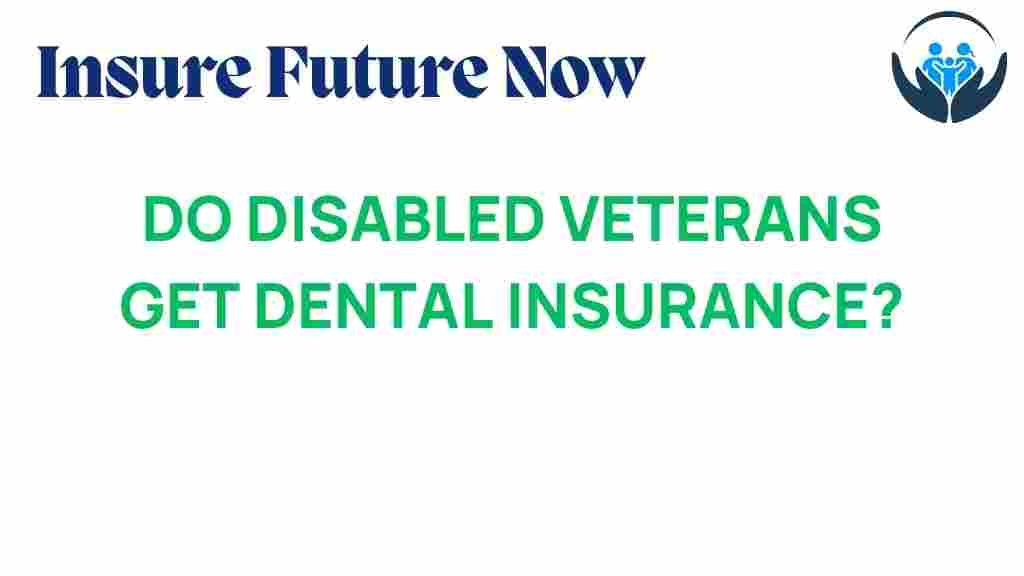Unlocking Dental Insurance Benefits for Disabled Veterans
Dental insurance is an essential component of healthcare for many individuals, specifically for disabled veterans who may have unique oral health needs. Understanding the benefits available to these veterans can help them secure necessary dental care and improve their overall well-being. In this comprehensive guide, we will explore the various coverage options, eligibility criteria, and the steps to access dental insurance benefits for disabled veterans.
Understanding Dental Insurance for Disabled Veterans
Dental insurance for disabled veterans encompasses a range of benefits designed to support those who have served in the military and are now facing health challenges. Many veterans may not be aware of the full spectrum of benefits available to them, which can include:
- Routine dental check-ups
- Preventive care
- Restorative procedures
- Oral surgery
- Emergency dental services
These benefits play a crucial role in maintaining oral health, which is closely linked to overall health. Proper dental care can prevent more serious health issues down the line, making it vital for disabled veterans to utilize their benefits effectively.
Eligibility for Dental Insurance Benefits
Eligibility for dental insurance benefits under military insurance varies depending on several factors. Here are the primary criteria for disabled veterans:
- Service-connected disability rating: Veterans with a service-connected disability rating of 100% are typically eligible for comprehensive dental benefits.
- Veterans with a disability rating of 0% to 90% may receive limited dental benefits, often restricted to specific situations such as dental trauma incurred during service.
- Enrollment in VA health care: Veterans must be enrolled in the Department of Veterans Affairs (VA) health care system to access dental benefits.
If you are unsure of your eligibility, it’s recommended to contact your local VA office or visit the official VA Health Care website for detailed information.
Types of Dental Insurance Coverage for Disabled Veterans
Disabled veterans can choose from various dental insurance plans. Below are the most common coverage options:
- VA Dental Insurance Program (VADIP): This program offers dental insurance to veterans and their family members who are enrolled in VA health care. It provides a range of coverage options through private insurance companies.
- TRICARE Dental Program: For veterans who are also part of the military retiree community, TRICARE offers a dental program that includes comprehensive coverage, preventive care, and orthodontic services.
- Private Dental Insurance: Many disabled veterans may opt to purchase private dental insurance plans that can cater to their specific needs. These plans often provide a wider range of dental services.
When selecting a plan, it’s essential to consider factors such as monthly premiums, out-of-pocket expenses, and the types of services covered.
Step-by-Step Process to Access Dental Insurance Benefits
Accessing dental insurance benefits as a disabled veteran involves several steps. Here’s a guide to help you navigate the process:
Step 1: Enroll in VA Health Care
The first step is to ensure that you are enrolled in the VA health care system. You can apply online or contact your local VA office for assistance.
Step 2: Determine Your Eligibility
Once enrolled, review your eligibility for dental benefits based on your service-connected disability rating. This information can often be found on the VA website or by inquiring directly with your VA representative.
Step 3: Choose Your Dental Insurance Plan
Evaluate the different dental insurance options available to you, such as the VA Dental Insurance Program or TRICARE. Consider your specific needs, budget, and the coverage each plan provides.
Step 4: Enroll in a Dental Insurance Plan
After selecting a suitable plan, follow the enrollment process as outlined by the insurance provider. This may involve filling out applications, providing documentation of your service-related disability, and selecting a payment method.
Step 5: Schedule Your Dental Appointments
Once enrolled, you can schedule appointments with participating dental providers. Make sure to verify that your dentist accepts your insurance plan to avoid unexpected costs.
Troubleshooting Common Issues
While navigating dental insurance benefits can be straightforward, some veterans may encounter challenges. Here are some common issues and how to address them:
- Denied Claims: If a dental claim is denied, review the reason for denial. You can appeal the decision by providing additional documentation or evidence supporting your claim.
- Limited Coverage: If your insurance plan provides limited coverage, consider supplementing your insurance with a private plan that offers more comprehensive benefits.
- Provider Availability: Sometimes, finding a dentist who accepts your specific insurance can be challenging. Use the insurance company’s provider directory or contact customer service for assistance in locating a network dentist.
Staying proactive and organized can help you avoid potential issues when accessing your dental benefits.
Conclusion: Prioritizing Oral Health for Disabled Veterans
Dental insurance is a vital resource for disabled veterans, providing essential benefits that can significantly improve their oral health and overall quality of life. By understanding the eligibility requirements, coverage options, and the process to access these benefits, veterans can make informed decisions that benefit their health.
Don’t let the complexities of dental insurance deter you from seeking the care you need. If you’re a disabled veteran, make sure to explore your options, stay informed about your benefits, and prioritize your oral health.
For more information about veterans’ health and available benefits, visit the VA Eligibility website.
This article is in the category Coverage and created by InsureFutureNow Team
